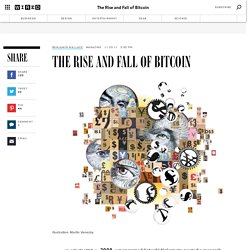

Monnaies complémentaires & alternatives - Future of money. Bitcoin. Bitcoin and Disruptive Currencies. Ars Technica reported earlier this month that Bitcoin, the open source cryptographically secured alternate currency, was back to trading at 9 US dollars per bitcoin.

The currency had experienced a bubble last year, trading as high as almost 30 USD before crashing spectacularly. Since then, however, it has regained stability and traded within a fairly small range around 5 USD. If Bitcoin can keep its stability, what might it mean for disruptive competition? Bitcoin is an online currency, but not one that should be confused with prior attempts at the idea. While companies in the past have tried to create their own online currencies, they all more or less relied upon the US Dollar as an underlying base, and were centrally controlled. Money today mostly has value because governments say that it does. Bitcoin, in contrast, uses a peer-to-peer network to keep track of payments. This simple fact makes Bitcoin potentially incredibly disruptive to a number of financially centered industries.
(8) Bitcoin: Is the cryptocurrency Bitcoin a good idea. Bitcoin P2P Virtual Currency. The Rise and Fall of Bitcoin. In November 1, 2008, a man named Satoshi Nakamoto posted a research paper to an obscure cryptography listserv describing his design for a new digital currency that he called bitcoin.

None of the list’s veterans had heard of him, and what little information could be gleaned was murky and contradictory. In an online profile, he said he lived in Japan. His email address was from a free German service. Google searches for his name turned up no relevant information; it was clearly a pseudonym.
But while Nakamoto himself may have been a puzzle, his creation cracked a problem that had stumped cryptographers for decades. One of the core challenges of designing a digital currency involves something called the double-spending problem. Bitcoin did away with the third party by publicly distributing the ledger, what Nakamoto called the “block chain.” When Nakamoto’s paper came out in 2008, trust in the ability of governments and banks to manage the economy and the money supply was at its nadir.
L019: Bitcoin P2P Currency: The Most Dangerous Project We've Ever Seen - Launch - Solid discussions of this piece on BoingBoing.net, Hacker News, Slashdot and Reddit.

Rob Tercek has a follow up to this piece here. by Jason Calacanis and the LAUNCH team A month ago I heard folks talking online about a virtual currency called bitcoin that is untraceable and un-hackable. Folks were using it to buy and sell drugs online, support content they liked and worst of all -- gasp! -- play poker. Bitcoin is a P2P currency that could topple governments, destabilize economies and create uncontrollable global bazaars for contraband. I sent the 30 or so producers of my show This Week in Startups out to research the top players, and we did a show on Bitcoin on May 10. After month of research and discovery, we’ve learned the following: 1. What Are Bitcoins? 1. Each owner transfers the coin to the next by digitally signing a hash of the previous transaction and the public key of the next owner and adding these to the end of the coin. The benefits of a currency like this:
(various to reclass 02)